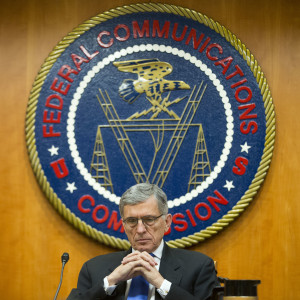The long-feared decline in investment among internet providers predicted by conservatives since the Federal Communications Commission passed its net neutrality order is finally occurring, according to one economist.
Investment in network growth among the 12 largest internet service providers (ISPs) in the U.S. fell by roughly $2.7 billion in the first six months of 2016 compared to the same period in 2014, the year before the FCC adopted its divisive net neutrality order, economist Hal Singer reports.
Singer, a principal at consulting firm Economists Incorporated and an adjunct professor at Georgetown University’s McDonough School of Business, said capital expenditures (capex) in network infrastructure fell $1.9 billion at AT&T, $1.2 billion at Verizon, $1.5 billion at Sprint and $130 million at CenturyLink in the second quarter of 2016, according to data released Thursday.
Though some ISPs including Comcast and T-Mobile invested more in their infrastructure in the first half of 2016 compared to 2014, those increases were substantially outweighed by the combined decreases mentioned above, Singer said.
The economist attributed those declines to the FCC’s decision to reclassify ISPs as common carrier public utilities in its 2015 Open Internet Order, a move Chairman Tom Wheeler and Democrats argued was necessary to enforce net neutrality rules banning ISPs from blocking, throttling or prioritizing web traffic.
Common carrier classification, the same designation shared by telephone networks, subjects ISPs to stricter regulations including price controls, a potentiality Republican FCC commissioners, lawmakers in Congress and economists including Singer warned would drive down investment in ISPs.
“Casting broadband providers as enemies of the state was thought to be good politics. It also makes for lousy economics,” Singer wrote. “Investors are understandably spooked. Investment flows to the sectors with the greatest expected return. Due to pricing and line-of-business restrictions, broadband isn’t looking all that attractive.”
The FCC forbore from its authority to set the prices consumers pay for service in the order, and though Wheeler has repeatedly pledged not to “deforbear,” he’s pursing a number of other regulatory proposals in the FCC’s newly claimed jurisdiction with his Democratic majority of commissioners.
Those efforts include privacy rules that would limit ISPs’ ability to collect consumer data used for targeted advertising and a rewrite of rules for the high-capacity business broadband market, aimed at controlling the prices businesses and smaller providers pay to use the networks of larger providers.
According to Singer and others, such proposals will drive investment away from ISPs and toward internet content providers — websites like Google, Facebook and Yahoo, not subject to FCC authority.
“Capital is predictably fleeing from digital infrastructure to the politically preferred content sector,” Singer said. “Verizon recently announced its planned $4.8 billion purchase of Yahoo, which follows its $4.4 billion purchase of AOL in 2015. Just this month, it made a $2.4 billion purchase of Fleetmatics, a fleet management firm that connects smart devices. Verizon is also shedding assets in its regulated segment, selling off pieces of its wireline broadband network.”
Last year, Singer reported capital expenditures by all wireline ISPs declined 12 percent and wireline and wireless ISPs by 8 percent in the first half of 2015 compared to the same time in 2014, though other economists argued the drop was almost entirely due to AT&T, which announced years prior an expected decline as a result of finishing a large investment project.
He’s been joined by other economists, including former chief economists at the FCC, in describing Wheeler’s tenure at the commission as one that’s marked a dramatic departure from the agency’s long history of conducting economic analyses before pursuing new rules.
Wheeler and Democrats argue the rules will set off a “virtuous circle” of investment resulting from consumer confidence in a fair and open internet, and that such investment is already on display via new competitors like Google’s growing fiber network.
Earlier this year, the chairman pointed out that revenue per subscriber went up in 2015 according to reports from ISPs themselves, and that venture investment in Internet-specific businesses went up 35 percent compared to 2014.
“As many of you recall, when the commission adopted these rules, critics howled that the rules would be devastating for network investment – that broadband deployment would screech to a halt,” Wheeler said earlier this year. “Well, as the virtuous circle predicts, investment continues pouring into startups whose ability to reach users requires unfettered Internet access.”
A federal appeals court upheld a legal challenge to the rules from ISPs earlier this summer, though providers have asked the court to second look.

